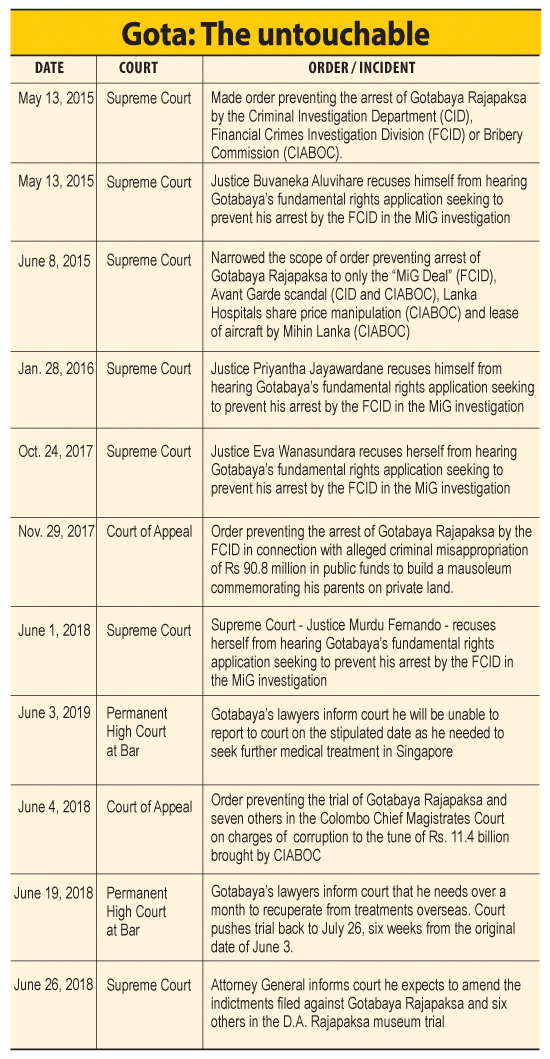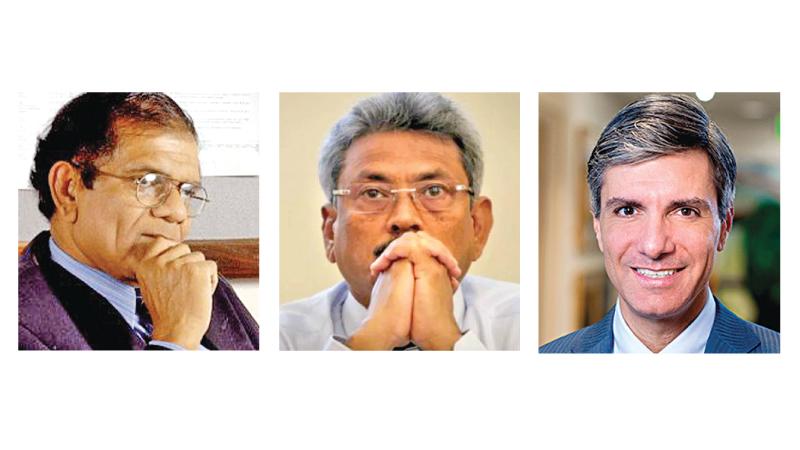
Former Defence Secretary Gotabaya Rajapaksa last Thursday (27) filed a motion in the California Central District Court seeking to dismiss the case filed against him by Ahimsa Wickrematunge over the alleged extra-judicial killing of Lasantha Wickrematunge, the founding Editor of The Sunday Leader.
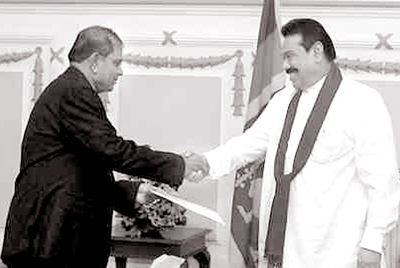 In an unprecedented move, former Chief Justice Asoka De Silva was appointed Advisor to the President by Mahinda Rajapaksa in 2011 after retiring as the head of the judiciary. |
Rajapaksa’s motion to dismiss the case was accompanied by a lengthy declaration filed in court on his behalf by former Chief Justice Asoka De Silva. “I submit this declaration at the request of Counsel for Defendant Nandasena Gotabaya Rapaksa in support of his motion to dismiss this action,” the declaration filed by the former CJ stated.
A curriculum vitae attached to the declaration states that De Silva was appointed as Sri Lanka’s 42nd Chief Justice in 2009. “On my retirement His Excellency the President of the Republic of Sri Lanka sought my services as Presidential Advisor,” the CV recalls.
It is extremely irregular for retired judges to accept government appointments after they retire from the Supreme Court, in order to preserve the appearance of the independence of the judiciary. Article 110 (3) of the Constitution explicitly forbids any person “who has held office as a permanent Judge of the Supreme Court or of the Court of Appeal” from pleading, acting, or practicing in any court, tribunal or institution as an Attorney-at-law at any time without the written consent of the President.
Ironically, the former Chief Justice cited this provision in his declaration on behalf of Rajapaksa. “Article 110 prohibits any Superior Court Judge from holding any other paid office or employment except with the written approval of the President. The same Article provides that no judge of the Supreme Court or Court of Appeal, after ceasing his office as a judge, may practice as a lawyer in any Court or tribunal without the written approval of the President.”
It is unclear whether the efforts of former Chief Justice De Silva in support of Gotabaya Rajapaksa would fall under the scope of this constitutional provision because the filing took place in a court of law outside of Sri Lanka’s jurisdiction.
While De Silva held office as Chief Justice, his son-in-law Isuru Balapatabendi was given a diplomatic posting to The Netherlands by the Rajapaksa Government. At the time, De Silva’s daughter was reportedly studying at the Leiden University in The Hague. Balapatabendi held office as a politically appointed diplomat from 2008-2010. De Silva retired as Chief Justice in May 2011.
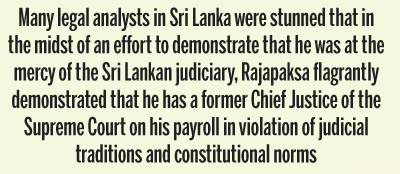 De Silva’s declaration intended to demonstrate that Rajapaksa could be held accountable by courts in Sri Lanka. In support of this claim, he annexed a copy of an indictment filed by the Attorney-General against Rajapaksa in August 2018 over the misuse of Rs. 33.9 million in public funds to construct a mausoleum for his parents.
De Silva’s declaration intended to demonstrate that Rajapaksa could be held accountable by courts in Sri Lanka. In support of this claim, he annexed a copy of an indictment filed by the Attorney-General against Rajapaksa in August 2018 over the misuse of Rs. 33.9 million in public funds to construct a mausoleum for his parents.
Despite being filed almost 11 months ago in the Permanent Trial-at-Bar, which is supposed to conclude cases expeditiously with day-to-day hearings, Rajapaksa’s trial has never begun. The case was thrown into uncertainty last Wednesday when the Attorney General’s Department, in response to a challenge filed before the Supreme Court, accepted flaws in the indictment and undertook to amend it, which may necessitate a refiling of the case and a reset in proceedings.
Earlier this month, Rajapaksa, who has taken up temporary residence in Singapore, failed to return to Sri Lanka or the court within the time stipulated for him to travel to Singapore. Citing medical grounds, Rajapaksa was granted an additional six-week delay in the start of the trial.
In 2017, he successfully petitioned the Court of Appeal in an ex-parte hearing and secured an order preventing his arrest in the investigation associated with this case.
The former defence secretary has secured similar orders from both the Supreme Court and Court of Appeal preventing his arrest in a slew of investigations ranging from the ‘MiG Deal’, Lanka Hospitals share price manipulation, Mihin Lanka aircraft leasing and the Avant Garde scandal. One order last year halted a trial from proceeding on a Rs 11.4 billion corruption charge.
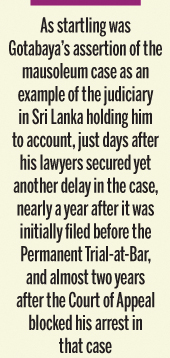 Four judges from the country’s apex courts have recused themselves from hearing cases involving Rajapaksa over the past four years, in some instances only after having granted orders in his favour.
Four judges from the country’s apex courts have recused themselves from hearing cases involving Rajapaksa over the past four years, in some instances only after having granted orders in his favour.
Nevertheless, at the core of the former Chief Justice’s argument in defence of Rajapaksa filed in the California court was that he could be held accountable by Sri Lanka’s independent judiciary if indeed the allegations were true.
Rajapaksa’s motion did not examine the merits of the case and the specific allegations filed by Ahimsa Wickrematunge. In fact, the motion filing was made with consciousness of the impact of the filing on the domestic constituency back in Sri Lanka, as is evidenced by a footnote to the motion.
“For the purposes of this motion only, Mr. Rajapaksa addresses the legal inadequacy of the Complaint even assuming that the well-pleaded allegations of the Complaint are true. While this temporary suspension of disbelief is an accepted feature of U.S. legal procedures, it is alien to Sri Lankan law. As many Sri Lankan citizens are following this case, Mr. Rajapaksa wishes to make absolutely clear that assuming the truth of the allegations for purposes of this motion in no way concedes their truth. To the contrary, Mr. Rajapaksa vigorously disputes the allegations.”
The motion also states explicitly that Gotabaya Rajapaksa “resides in Sri Lanka and is currently running for president there.” He states that the papers for relinquishing his US citizenship were only handed over to the US Embassy in Colombo on April 17, 2019, 10 days after he was served with summons for the Wickrematunge murder case at a Trader Joe’s carpark in Los Angeles, California.
Claiming that he is no longer a US citizen because he has now filed his papers, Rajapaksa argues that “nothing whatsoever ties this litigation to the United States.”
“Both Ahimsa Wickrematunge and Gotabaya Rajapaksa are domiciled in foreign jurisdictions, the alleged conduct occurred in a foreign jurisdiction, and all relevant evidence is located in a foreign jurisdiction. The only reason Plaintiff was able to sue in this District is that she managed to obtain ‘gotcha’ jurisdiction by serving Mr. Rajapaksa while he was visiting California.”
Rajapaksa also claims diplomatic immunity for his alleged actions, on the basis that the alleged conduct was undertaken in his capacity as Defence Secretary. “Rajapaksa therefore is immune from suit under common-law foreign-official immunity,” his lawyers pleaded.
“He committed the alleged wrongdoing while acting within the structure of the Sri Lankan government, drawing on his official power as Defence Secretary,” the motion posits. “The allegation that Rajapaksa acted in derogation of a norm against extrajudicial killing does not change this analysis.”
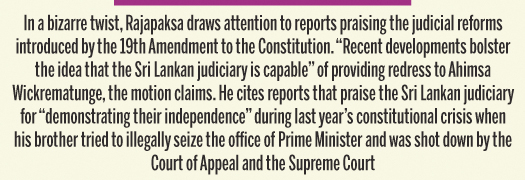 However, foreign ministry officials state that at no time did Rajapaksa, a US-Sri Lankan dual citizen, enjoy diplomatic immunity from Sri Lanka, and his US citizenship complicates efforts to claim immunity in that jurisdiction.
However, foreign ministry officials state that at no time did Rajapaksa, a US-Sri Lankan dual citizen, enjoy diplomatic immunity from Sri Lanka, and his US citizenship complicates efforts to claim immunity in that jurisdiction.
Sri Lanka’s sovereignty and national security also make an appearance. “Because this case involves questions relating to politics and security that go to the heart of Sri Lanka’s national sovereignty—and because it involves no questions that directly relate to California—Sri Lanka, not the Central District of California, is the appropriate forum.”
Rajapaksa’s attorneys praise Sri Lanka’s “well-established legal system steeped in the English common law and Roman Dutch law, among other traditions, as well as a constitutional structure of government and an independent judiciary.”
In a bizarre twist, Rajapaksa draws attention to reports praising the judicial reforms introduced by the 19th Amendment to the Constitution. “Recent developments bolster the idea that the Sri Lankan judiciary is capable” of providing redress to Ahimsa Wickrematunge, the motion claims. He cites reports that praise the Sri Lankan judiciary for “demonstrating their independence” during last year’s constitutional crisis when his brother tried to illegally seize the office of Prime Minister and was shot down by the Court of Appeal and the Supreme Court.
In this same vein, Rajapaksa alleges that adjudicating the Wickrematunge case in California would deprive Sri Lanka’s judiciary of the opportunity to “stand tall” and “pass judgment on behalf of its own people.”
Rajapaksa also pleaded that “caseloads in the Central District of California are high, and there is no reason to further burden this court with a case that has no connection to this district or the United States more broadly,” and that the cost of hearing the case in California “will significantly outstrip any local interest it may hold.”
“The facts alleged in the Complaint suggest that all relevant evidence is located abroad, and some appears to be in the possession of a foreign government. The United States will need to expend substantial resources to request the evidence, and, if it does receive it—which is far from certain, given the national security implications raised by this litigation—there may be additional translation costs.”
Rajapaksa also expresses concern that witnesses listed by Ahimsa Wickrematunge, “who allegedly conspired with Rajapaksa and executed his orders,” may be unwilling to testify because doing so could expose them to liability. Indeed, the fate of such witnesses domiciled in Sri Lanka would be unclear if Gotabaya Rajapaksa were to be elected the next President of Sri Lanka.
Rajapaksa also implies that even if the California Court ruled against him in the case “it would be difficult to enforce the judgment.” Again, the motion highlights that “Rajapaksa resides in Sri Lanka, where he is running for president.”
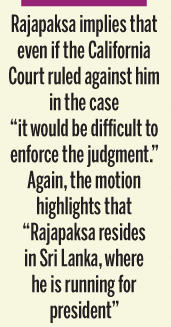 The emphasis by Rajapaksa that he is running for president comes even though no election has yet been called, and no party has formally endorsed his candidacy. However, were he to be elected president, no legal remedy would be available against him in Sri Lanka. Article 35 of the Constitution states that “While any person holds office as President of the Republic of Sri Lanka, no civil or criminal proceedings shall be instituted or continued against the President in respect of anything done or omitted to be done by the President, either in his official or private capacity.”
The emphasis by Rajapaksa that he is running for president comes even though no election has yet been called, and no party has formally endorsed his candidacy. However, were he to be elected president, no legal remedy would be available against him in Sri Lanka. Article 35 of the Constitution states that “While any person holds office as President of the Republic of Sri Lanka, no civil or criminal proceedings shall be instituted or continued against the President in respect of anything done or omitted to be done by the President, either in his official or private capacity.”
In effect, if Rajapaksa were to become President, Sri Lankan courts would become off-limits to Ahimsa Wickrematunge or anyone else seeking to hold him to account in any civil or criminal proceedings.
Rajapaksa’s motion concludes as follows. “This case—brought against a former Sri Lankan Defense Secretary and current presidential candidate just before elections there—has no place in a U.S. court. Everything about this case is centered in Sri Lanka; nothing connects it to this District. The Defendant is immune from suit for his official conduct. And the Complaint is barred because it is untimely, because all the alleged conduct occurred abroad, and because Plaintiff failed to exhaust Sri Lankan remedies. The Court should dismiss the Complaint in its entirety and with prejudice.”
According to US law, Ahimsa Wickrematunge and the Centre for Justice and Accountability (CJA) who filed the lawsuit on her behalf, have 30 days to respond Rajapaksa’s motion to dismiss the case, with counterarguments and experts of their own.
Many legal analysts in Sri Lanka were stunned that in the midst of an effort to demonstrate that he was at the mercy of the Sri Lankan judiciary, Rajapaksa flagrantly demonstrated that he has a former Chief Justice of the Supreme Court on his payroll in violation of judicial traditions and constitutional norms.
As startling was his assertion of the mausoleum case as an example of the judiciary in Sri Lanka holding him to account, just days after his lawyers secured yet another delay in the case, nearly a year after it was initially filed before the Permanent Trial-at-Bar, and almost two years after the Court of Appeal blocked his arrest in that case.
The reality of Gotabaya Rajapaksa’s vulnerability to the Sri Lankan justice system since he relinquished office in January 2015 is that he has obtained orders preventing his arrest or trial on more cases than the number in which police have even recorded his statement.
In a brief interview, Ahimsa Wickrematunge told the Sunday Observer that she and her attorneys were aware of the motion filed by Rajapaksa seeking the dismissal of the suit, and that their response to his claims will be filed with the District Court in California.
Pressed on her reaction to Rajapaksa’s motion being supported by the former Chief Justice who presided over the judiciary during crucial initial stages of the investigation into her father’s murder, the slain journalist’s daughter was somber and poignant. “There is no reason to be surprised. This is Gotabaya Rajapaksa.”
